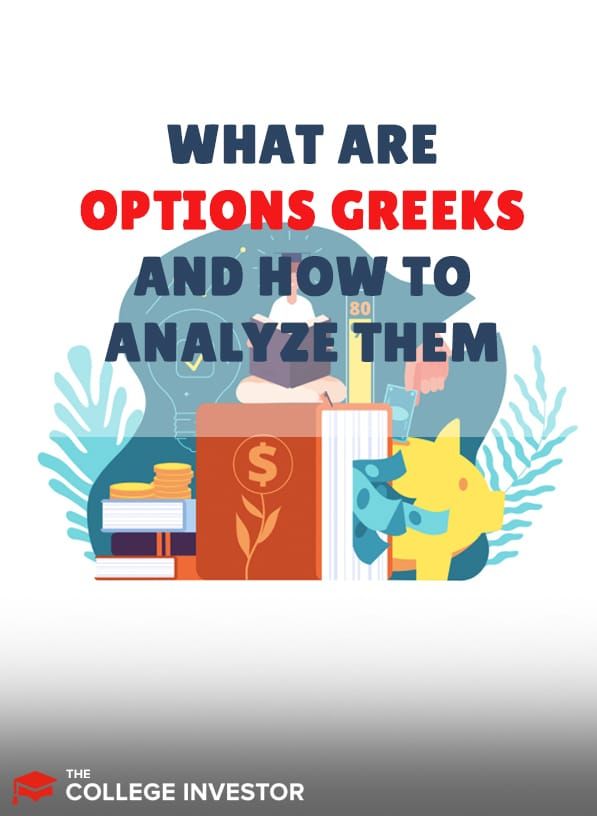
The option Greeks aren't gods that options traders worship. Options are derivatives of stocks. And the greeks explain how these derivatives move.
Understanding option Greeks can help traders in choosing specific options and better understanding the risks associated with them.
For equity options, each option is based on an underlying stock or ETF. Moves in the underlying ripple into the option. The Greeks are used to describe the association between the underlyings price moves and the option’s premium price moves. If you aren’t sure what premium is, it’s basically the option’s price.
We will divide our discussion of the Greeks into three categories: Price, time, and implied volatility. Those are the categories that each of the four Greeks fall into. Let’s get started.
Delta
Delta is a price Greek. It describes how much an option’s premium will change based on a $1.00 price move in the underlying stock. Delta is probably the most widely -watched Greek and one of the simplest to understand.
To see how delta works, let's look at an option that has a $0.50 price. In other words, it has $0.50 of premium. When the underlying stock increases by $1.00, the option’s premium will increase from 0.50 to 1.00.
Delta is also used to describe the probability of an option expiring ITM (in-the-money). For example, we buy the ABC Jul09 50 call option. It has a strike of 50, and the underlying price is 49.50. This option's delta is 0.75. The delta is telling us there is a 75% chance that the underlying's price will be at or above 50.00 by the option's expiration (July 9).
To summarize delta, it increases as the underlying stock price approaches the option’s strike (closer to ITM) and decreases as the stock price moves away from the option’s strike (further OTM or out-of-the-money).
Related: Options Trading 101: What You Need To Know To Start
Gamma
Gamma is another price-based Greek and is a second derivative. It measures the delta’s rate of change. What do we mean by the second derivative?
As mentioned earlier, options are a derivative of the underlying stock. When you attach a measurement onto a derivative, you get another derivative (i.e., second derivative).
How does gamma work? After the first $1.00 move in the underlying, add delta and gamma together to find the next dollar-based move. Let’s say gamma is 0.05.
From the earlier delta example, after the first $1.00 stock move, the delta increases from 0.50 to 1.00. We can find out the next increase in premium on the next $1.00 underlying move by adding gamma to delta: 0.50 + 0.05 + 1.00 = 1.55. This tells us we should expect a premium of 1.55 on the second dollar move.
Continued Reading: How To Analyze And Trade Options
Theta
Now we move out of price-based Greeks and into the time component, which brings us to theta. Theta measures the amount of premium an option loses with each passing day. If theta for an option is 0.02, we should expect 0.02 of premium to drop off each day.
Using a simple example, an option has $1.00 of premium. After four days, it will be worth (0.02 x 4) 0.92, if only theta affects the price. Of course, options are complex creations, and far more than just theta will affect an options price. But theta certainly has an impact on the option’s price.
It’s important to know that as we get closer to expiry (i.e., expiration), the options premium will decrease or decay quicker. During the last 30 days leading up to expiry, theta kicks into overdrive, as the option’s premium decays fastest during this period.
Time decay works against option buyers and for option sellers. Traders who buy calls or puts need the underlying to go above the call strike or below the put strike before expiry. Otherwise, the option will expire worthless.
For option sellers, time isn't as much of a concern. Just as long as the underlying does not violate their strike, they'll collect the full premium when the option goes to zero at expiration (i.e., expires worthless).
Vega
Vega is a volatility-based derivative measurement. It measures implied volatility (IV). Specifically, how much premium changes with each 1% move in implied volatility.
As an example:
Prem = 1.00
Vega = 0.05
If IV decreases by 1%, the premium will drop to 1.00 - 0.05 = 0.95.
Options with a longer expiry have a higher vega. For example, an option with 45 days remaining before expiry will have a higher vega than one with only 10 days until expiry.
Bringing It All Together
How does someone make use of the option Greeks? As mentioned earlier, if you're doing hand calculations or eye-balling the Greeks, delta is probably the one you're most interested in.
That doesn’t mean the others aren’t useful. But with options being a purely mathematical creation, the Greeks are best used in models. Models are able to crunch numbers quickly and spit out option price ranges for particular dates.
Related: How To Choose The Right Strike Price And Expiration For Options
What About Rho, Vanna, And Charm?
There are a few other odd names to mention and one more Greek. Rho is an option Greek but is less mentioned when talking about option Greeks. Rho is tied to a 1% move in interest rates. As you can imagine, interest rates don't move that often. Unless you have a long-dated option, Rho simply doesn’t apply.
Delta hedging is another option concept. I only mention it because it may become confused with the delta Greek. However, that isn’t exactly what delta hedging is. Dealers use Delta hedging to hedge their (order) book.
They'll use delta to determine if their book is neutral. For example, a dealer that is long 10 instruments with a delta of 0.70 and short 10 with a delta of -0.60 is long by 0.10 delta. This dealer will likely look to short more, bringing their delta to 0.
The mechanics behind this use more strange names called Vanna and Charm. Vanna is volatility exposure and Charm is time exposure.
Final Thoughts
There are also option minors. We didn't discuss them here because they're rarely mentioned when discussing the Greeks. Their names are lambda, epsilon, vomma, vera, speed, zomma, color, and ultima.
The minor Greeks get into "derivative of the derivative of the derivative" type stuff. If you followed that, it means second and third derivatives. At some point, the higher-level derivatives become useless to humans as we can’t really perceive their results. It’s all models from there.
But the main option Greeks discussed above can be understood by average traders with just a little bit of study and practice. And once you understand what these Greeks are and how they work, you'll be able to make faster and more data-based decisions as an options trader.

Robert Farrington is America’s Millennial Money Expert® and America’s Student Loan Debt Expert™, and the founder of The College Investor, a personal finance site dedicated to helping millennials escape student loan debt to start investing and building wealth for the future. You can learn more about him on the About Page or on his personal site RobertFarrington.com.
He regularly writes about investing, student loan debt, and general personal finance topics geared toward anyone wanting to earn more, get out of debt, and start building wealth for the future.
He has been quoted in major publications, including the New York Times, Wall Street Journal, Washington Post, ABC, NBC, Today, and more. He is also a regular contributor to Forbes.
Editor: Clint Proctor Reviewed by: Chris Muller
